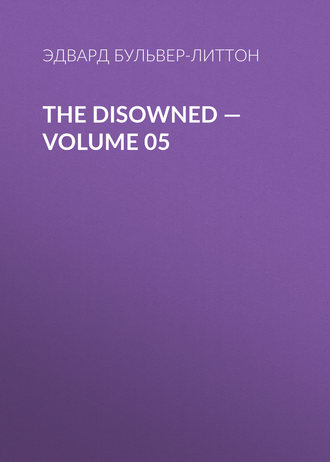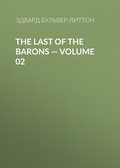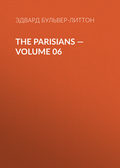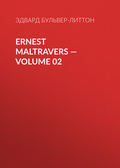
Эдвард Бульвер-Литтон
The Disowned — Volume 05
CHAPTER LII
Are we contemned?—The Double Marriage.
It was dusk when Clarence arrived at the very same inn at which, more than five years ago, he had assumed his present name. As he recalled the note addressed to him, and the sum (his whole fortune) which it contained, he could not help smiling at the change his lot had since then undergone; but the smile soon withered when he thought of the kind and paternal hand from which that change had proceeded, and knew that his gratitude was no longer availing, and that that hand, in pouring its last favours upon him, had become cold. He was ushered into No. 4, and left to his meditations till bed-time.
The next day he recommenced his journey. Westborough Park, was, though in another county, within a short ride of W——; but, as he approached it, the character of the scenery became essentially changed. Bare, bold, and meagre, the features of the country bore somewhat of a Scottish character. On the right side of the road was a precipitous and perilous descent, and some workmen were placing posts along a path for foot-passengers on that side nearest the carriage- road, probably with a view to preserve unwary coachmen or equestrians from the dangerous vicinity of the descent, which a dark night might cause them to incur. As Clarence looked idly on the workmen, and painfully on the crumbling and fearful descent I have described, he little thought that that spot would, a few years after, become the scene of a catastrophe affecting in the most powerful degree the interests of his future life. Our young traveller put up his horse at a small inn, bearing the Westborough arms, and situated at a short distance from the park gates. Now that he was so near his mistress— now that less than an hour, nay, than the fourth part of an hour, might place him before her, and decide his fate—his heart, which had hitherto sustained him, grew faint, and presented, first fear, then anxiety, and, at last, despondency to his imagination and forebodings.
"At all events," said he, "I will see her alone before I will confer with her artful and proud mother or her cipher of a father. I will then tell her all my history, and open to her all my secrets: I will only conceal from her my present fortunes; for even if rumour should have informed her of them, it will be easy to give the report no sanction; I have a right to that trial. When she is convinced that, at least, neither my birth nor character can disgrace her, I shall see if her love can enable her to overlook my supposed poverty and to share my uncertain lot. If so, there will be some triumph in undeceiving her error and rewarding her generosity; if not, I shall be saved from involving my happiness with that of one who looks only to my worldly possessions. I owe it to her, it is true, to show her that I am no low-born pretender: but I owe it also to myself to ascertain if my own individual qualities are sufficient to gain her hand."
Fraught with these ideas, which were natural enough to a man whose peculiar circumstances were well calculated to make him feel rather soured and suspicious, and whose pride had been severely wounded by the contempt with which his letter had been treated, Clarence walked into the park, and, hovering around the house, watched and waited that opportunity of addressing Lady Flora, which he trusted her habits of walking would afford him; but hours rolled away, the evening set in, and Lady Flora had not once quitted the house.
More disappointed and sick at heart than he liked to confess, Clarence returned to his inn, took his solitary meal, and strolling once more into the park, watched beneath the windows till midnight, endeavouring to guess which were the casements of her apartments, and feeling his heart beat high at every light which flashed forth and disappeared, and every form which flitted across the windows of the great staircase. Little did Lady Flora, as she sat in her room alone, and, in tears, mused over Clarence's fancied worthlessness and infidelity, and told her heart again and again that she loved no more,—little did she know whose eye kept vigils without, or whose feet brushed away the rank dews beneath her windows, or whose thoughts, though not altogether unmingled with reproach, were riveted with all the ardour of a young and first love upon her.
It was unfortunate for Linden that he had no opportunity of personally pleading his suit; his altered form and faded countenance would at least have insured a hearing and an interest for his honest though somewhat haughty sincerity: but though that day, and the next, and the next, were passed in the most anxious and unremitting vigilance, Clarence only once caught a glimpse of Lady Flora, and then she was one amidst a large party; and Clarence, fearful of a premature and untimely discovery, was forced to retire into the thicknesses of the park, and lose the solitary reward of his watches almost as soon as he had won it.
Wearied and racked by his suspense, and despairing of obtaining any favourable opportunity for an interview without such a request, Clarence at last resolved to write to Lady Flora, entreating her assent to a meeting, in which he pledged himself to clear up all that had hitherto seemed doubtful in his conduct or mysterious in his character. Though respectful, urgent, and bearing the impress of truth and feeling, the tone of the letter was certainly that of a man who conceived he had a right to a little resentment for the past and a little confidence for the future. It was what might well be written by one who imagined his affection had once been returned, but would as certainly have been deemed very presumptuous by a lady who thought that the affection itself was a liberty.
Having penned this epistle, the next care was how to convey it. After much deliberation it was at last committed to the care of a little girl, the daughter of the lodge-keeper, whom Lady Flora thrice a week personally instructed in the mysteries of spelling, reading, and calligraphy. With many injunctions to deliver the letter only to the hands of the beautiful teacher, Clarence trusted his despatches to the little scholar, and, with a trembling frame and wistful eye, watched Susan take her road, with her green satchel and her shining cheeks, to the great house.
One hour, two hours, three hours, passed, and the messenger had not returned. Restless and impatient, Clarence walked back to his inn, and had not been there many minutes before a servant, in the Westborough livery, appeared at the door of the humble hostelry, and left the following letter for his perusal and gratification:—
WESTBOROUGH PASS
Sir,—The letter intended for my daughter has just been given to me by Lady Westborough. I know not what gave rise to the language, or the very extraordinary request for a clandestine meeting, which you have thought proper to address to Lady Flora Ardenne; but you will allow me to observe that, if you intend to confer upon my daughter the honour of a matrimonial proposal, she fully concurs with me and her mother in the negative which I feel necessitated to put upon your obliging offer.
I need not add that all correspondence with my daughter must close here. I have the honour to be, sir,
Your very obedient servant, WESTBOROUGH.
TO CLARENCE LINDEN, Esq.
Had Clarence's blood been turned to fire, his veins could not have swelled and burned with a fiercer heat than they did, as he read the above letter,—a masterpiece, perhaps, in the line of what may be termed the "d—d civil" of epistolary favours. "Insufferable arrogance!" he muttered within his teeth. "I will live to repay it. Perfidious, unfeeling woman: what an escape I have had of her! Now, now, I am on the world, and alone, thank Heaven. I will accept Aspeden's offer, and leave this country; when I return, it shall not be as a humble suitor to Lady Flora Ardenne. Pish! how the name sickens me: but come, I have a father; at least a nominal one. He is old and weak, and may die before I return. I will see him once more, and then, hey for Italy! Oh! I am so happy,—so happy at my freedom and escape. What, ho! waiter! my horse instantly!"
CHAPTER LIII
Lucr.—What has thy father done?
Beat.—What have I done? Am I not innocent?
—The Cenci.
Tam twilight was darkening slowly over a room of noble dimensions and costly fashion. Although it was the height of summer, a low fire burned in the grate; and, stretching his hands over the feeble flame, an old man of about sixty sat in an armchair curiously carved with armorial bearings. The dim yet fitful flame cast its upward light upon a countenance, stern, haughty, and repellent, where the passions of youth and manhood had dug themselves graves in many an iron line and deep furrow: the forehead, though high, was narrow and compressed; the brows sullenly overhung the eyes; and the nose, which was singularly prominent and decided, age had sharpened, and brought out, as it were, till it gave a stubborn and very forbidding expression to the more sunken features over which it rose with exaggerated dignity. Two bottles of wine, a few dried preserves, and a water glass, richly chased, and ornamented with gold, showed that the inmate of the apartment had passed the hour of the principal repast, and his loneliness at a time usually social seemed to indicate that few olive branches were accustomed to overshadow his table.
The windows of the dining-room reached to the ground, and without the closing light just enabled one to see a thick copse of wood, which, at a very brief interval of turf, darkened immediately opposite the house. While the old man was thus bending over the fire and conning his evening contemplations, a figure stole from the copse I have mentioned, and, approaching the window, looked pryingly into the apartment; then with a noiseless hand it opened the spring of the casement, which was framed on a peculiar and old-fashioned construction, that required a practised and familiar touch, entered the apartment, and crept on, silent and unperceived by the inhabitant of the room, till it paused and stood motionless, with folded arms, scarce three steps behind the high back of the old man's chair.
In a few minutes the latter moved from his position, and slowly rose; the abruptness with which he turned, brought the dark figure of the intruder full and suddenly before him: he started back, and cried in an alarmed tone, "Who is there?"
The stranger made no reply.
The old man, in a voice in which anger and pride mingled with fear, repeated the question. The figure advanced, dropped the cloak in which it was wrapped, and presenting the features of Clarence Linden, said, in a low but clear tone,—
"Your son."
The old man dropped his hold of the bell-rope, which he had just before seized, and leaned as if for support against the oak wainscot; Clarence approached.
"Yes!" said he, mournfully, "your unfortunate, your offending, but your guiltless son. More than five years I have been banished from your house; I have been thrown, while yet a boy, without friends, without guidance, without name, upon the wide world, and to the mercy of chance. I come now to you as a man, claiming no assistance, and uttering no reproach, but to tell you that him whom an earthly father rejected God has preserved; that without one unworthy or debasing act I have won for myself the friends who support and the wealth which dignifies life,—since it renders it independent. Through all the disadvantages I have struggled against I have preserved unimpaired my honour, and unsullied my conscience; you have disowned, but you might have claimed me without shame. Father, these hands are clean!"
A strong and evident emotion shook the old man's frame. He raised himself to his full height, which was still tall and commanding, and in a voice, the natural harshness of which was rendered yet more repellent by passion, replied, "Boy! your presumption is insufferable. What to me is your wretched fate? Go, go, go to your miserable mother: find her out; claim kindred there; live together, toil together, rot together, but come not to me! disgrace to my house, ask not admittance to my affections; the law may give you my name, but sooner would I be torn piecemeal than own your right to it. If you want money, name the sum, take it: cut up my fortune to shreds, seize my property, revel on it; but come not here. This house is sacred; pollute it not: I disown you; I discard you; I,—ay, I detest,—I loathe you!"
And with these words, which came forth as if heaved from the inmost heart of the speaker, who shook with the fury he endeavoured to stifle, he fell back into his chair, and fixed his eyes, which glared fearfully through the increasing darkness upon Linden, who stood high, erect, and sorrowfully before him.
"Alas, my lord!" said Clarence, with mournful bitterness, "have not the years which have seared your form and whitened your locks brought some meekness to your rancour, some mercy to your injustice, for one whose only crime against you seems to have been his birth. But I said I came not to reproach, nor do I. Many a bitter hour, many a pang of shame and mortification and misery, which have made scars in my heart that will never wear away, my wrongs have cost me; but let them pass. Let them not swell your future and last account whenever it be required. I am about to leave this country, with a heavy and foreboding heart; we may never meet again on earth. I have no longer any wish, any chance, of resuming the name you have deprived me of. I shall never thrust myself on your relationship or cross your view. Lavish your wealth upon him whom you have placed so immeasurably above me in your affections. But I have not deserved your curse, Father; give me your blessing, and let me depart in peace."
"Peace! and what peace have I had? what respite from gnawing shame, the foulness and leprosy of humiliation and reproach, since—since—? But this is not your fault, you say: no, no,—it is another's; and you are only the mark of my stigma; my disgrace, not its perpetrator. Ha! a nice distinction, truly. My blessing you say! Come, kneel; kneel, boy, and have it!"
Clarence approached, and stood bending and bareheaded before his father, but he knelt not.
"Why do you not kneel?" cried the old man, vehemently.
"It is the attitude of the injurer, not of the injured!" said Clarence, firmly.
"Injured! insolent reprobate, is it not I who am injured? Do you not read it in my brow,—here, here?" and the old man struck his clenched hand violently against his temples. "Was I not injured?" he continued, sinking his voice into a key unnaturally low; "did I not trust implicitly? did I not give up my heart without suspicion? was I not duped deliciously? was I not kind enough, blind enough, fool enough and was I not betrayed,—damnably, filthily betrayed? But that was no injury. Was not my old age turned into a sapless tree, a poisoned spring? Were not my days made a curse to me, and my nights a torture? Was I not, am I not, a mock and a by-word, and a miserable, impotent, unavenged old man? Injured! But this is no injury! Boy, boy, what are your wrongs to mine?"
"Father!" cried Clarence, deprecatingly, "I am not the cause of your wrongs: is it just that the innocent should suffer for the guilty?"
"Speak not in that voice!" cried the old man, "that voice!—fie, fie on it. Hence! away! away, boy! why tarry you? My son! and have that voice? Pooh, you are not my son. Ha! ha!—my son?"
"What am I, then?" said Clarence, soothingly: for he was shocked and grieved, rather than irritated by a wrath which partook so strongly of insanity.
"I will tell you," cried the father, "I will tell you what you are: you are my curse!"
"Farewell!" said Clarence, much agitated, and retiring to the window by which he had entered; "may your heart never smite you for your cruelty! Farewell! may the blessing you have withheld from me be with you!"
"Stop! stay!" cried the father; for his fury was checked for one moment, and his nature, fierce as it was, relented: but Clarence was already gone, and the miserable old man was left alone to darkness, and solitude, and the passions which can make a hell of the human heart!







